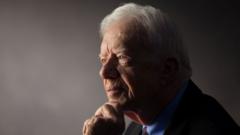Reflecting on the legacy of former US President Jimmy Carter, who passed away after spending over four decades post-presidency, parallels can be drawn to the current administration under President Joe Biden. The trials faced by both leaders, particularly in 2024, showcase a striking continuity of challenges that appear timeless, from economic pressures to geopolitical conflicts.
During Carter's tenure in the late 1970s, the United States confronted a severe crisis of confidence, with economic distress and foreign policy dilemmas creating national unease. Fast forward to today, Biden is similarly wrestling with issues that have roots in historical tensions — economics, environmental crises, and threats posed by global adversaries.
Carter is notably remembered for his diplomatic success, particularly the Camp David Accords that initiated peace between Egypt and Israel in 1978. However, this victory was overshadowed just a year later by the Iranian hostage crisis, which starkly illustrated the limitations of American power. This theme of vulnerability recurred in Biden’s presidency, most exemplified by the tumultuous withdrawal from Afghanistan in 2021, which ended an extensive and often fruitless effort at rebuilding.
Both administrations reflect a similar struggle against external forces in regions like Afghanistan and Iran, with Carter facing backlash for his response to the Soviet invasion of Afghanistan, while Biden has managed the response to the ongoing conflict in Ukraine. Although Biden has united allies to support Ukraine against Russia, the continued complexities of war create pressures reminiscent of the past, evoking sentiments about the consequences of prolonged conflict.
Moreover, issues surrounding peace in the Middle East remain unresolved, echoing Carter’s incomplete achievements. The ongoing humanitarian crises, including recent conflicts involving Israel and Hamas, underscore the persisting lack of resolution to longstanding issues like the Palestinian question that Carter himself faced.
Domestically, an inflation crisis has drawn parallels to the economic turmoil of Carter’s presidency, echoing the socio-economic challenges faced by both leaders. Despite job growth currently outpacing Carter's experience, Biden's administration has struggled with public discontent due to inflation, reminding many of the sentiments that led to low approval ratings during Carter’s presidency.
A pivotal element connecting these presidencies is the prevailing public distrust of government. In a 1979 address, Carter characterized the situation as a "crisis of confidence," a sentiment that has only deepened over the decades. This skepticism remains a hallmark of the Biden administration, particularly following the political turbulence surrounding the Trump presidency.
The comparison between these two presidents fosters discussions about humility in leadership. Carter, who prioritized service and community engagement post-presidency, contrasts sharply with Trump’s focus on political strife and re-election ambitions following his term. As Biden navigates similar tensions, the realities of governance today reflect those Carter grappled with, illustrating both the evolution and stagnation of American political life.
In conclusion, as America commemorates Jimmy Carter's impactful life and presidency, it is essential to recognize how the past continues to reverberate through the present under Joe Biden's leadership. Both presidents embody the complex interplay of hope, challenge, and the enduring struggle for unity in a deeply divided nation.






















